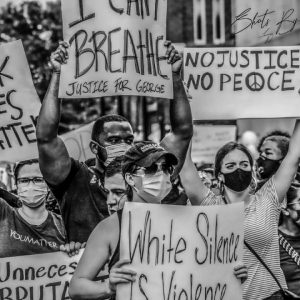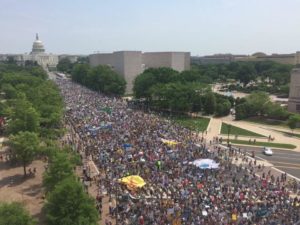Response to Systemic Racism
Response to Systemic Racism

Featured image from Jamar Lanham at a protest in Raleigh, NC during the weekend of May 30-31, 2020. #Lanhamphotography
Posted on June 3, 2020
NCIPL envisions a stable climate where humans live in right and just relationships, interconnected with a healthy, thriving, natural world. NCIPL accomplishes its mission by encouraging a culture shift towards environmental justice and creation care, while underscoring the importance of climate action for people of faith and conscience as a moral imperative.
NCIPL has adopted the US Climate Action Network’s JEDI: Justice, Equity, Diversity, Inclusion Statement as our guiding values. In order to live into this vision, we must talk about, and unlearn, the sin of racism. That means dedicating ourselves to environmental justice and therefore racial justice. It also means speaking honestly and openly about our current moment.
Fighting structural racism is – and must be – integral to NCIPL’s climate justice mission. As we mourn, listen, learn, and mobilize we will be redoubling our efforts to fight for equality.
We at NCIPL are fully committed to making that happen, and the first step is for us all to state unequivocally that Black Lives Matter.
As the Creation Care program of the NC Council of Churches, we are also sharing with you our Governing Board Statement and press release below.
In prayer and action,
Susannah Tuttle, M.Div
NCIPL Director
Sarah Ogletree, M.Div
NCIPL Program Coordinator
Statement from the North Carolina Council of Churches
A resolution adopted by the Governing Board of the North Carolina Council of Churches, June 2, 2020.
Whereas the North Carolina Council of Churches was founded in 1935, primarily for the purpose of addressing racial inequity and racial injustice, and
Whereas our white founders soon recognized that racial equity and racial justice should not be discussed without including racially/ethnically diverse voices and so included black faith leaders from North Carolina as members of the Council by 1943, and
Whereas we have striven together in these eight decades to support the Civil Rights Act, support the Voting Rights Act, lament the deaths of untold black neighbors whose names are written on the heart of God and on the hearts of those who loved them, call for justice when the systems of justice failed us, and hold firm to the belief that our diversity makes us stronger, and
Whereas the murder of George Floyd by a white police officer while three other white officers watched has exacerbated an already unacceptable devaluing of black and brown lives, and
Whereas racism has been compared to a complex underground rhizome that spreads unseen before erupting into specific social structures (e.g., law enforcement), concentrating attention on this part of the structure while the main tumor continues to strengthen racism in the remainder of the system, and
Whereas we recognize and confess that the racist systems in which we live primarily benefit white people, we therefore place a higher expectation on white people to do the necessary work of dismantling these systems;
The Governing Board of the North Carolina Council of Churches hereby resolves to press ahead with urgency to understand the dynamics of racism in all of its manifestations and to be transformative in society by working across systems and structures where interpersonal, systemic and institutional racism operate, and to work to dismantle the racist systems that perpetuate and allow violence against black and brown bodies.
We will immediately and actively:
- Bear witness to the Gospel that proclaims each of us are beloved of God;
- Educate people, particularly white people, about the underlying structures of systemic racism, especially educational, health care, judicial, economic, religious, and governmental systems;
- Teach the truth that white privilege benefits white people in ways that must be acknowledged by them;
- Empower white people to move beyond passive support to become active allies of black and brown people;
- Denounce the increased militarization of our local police forces and call for accountability such as: ban chokeholds and strangleholds, implement use-of-force continuums, institute de-escalation training, establish diversity and inclusion training, and require comprehensive community reporting;
- Confess that white supremacy infects the very systems that are meant to ensure “liberty and justice for all”;
- Disrupt the current systems by refusing to accept indifference (“It’s not my problem”), claims of innocence (“I’m not a racist”), disavowal of responsibility (“I don’t see color”), minimizing the issue (“All lives matter”), or willful helplessness (“There’s nothing I can do”); and
- Create systems that tangibly make rapartions for the damage of over 400 years of slavery and oppression by standing in solidarity with and amplifying the voices of black and brown people who have experienced suffering, pain and violence as a result of the current systems.
—
Founded in 1935, the North Carolina Council of Churches enables denominations, congregations, and people of faith to impact our state on issues such as racial equity, farmworker rights, environment, LGBTQ+ rights, economic justice and development, human well-being, equality, compassion and peace, following the example and mission of Jesus Christ. The Council comprises 26 distinct judicatories from 18 denominations. Across the state, our members have over 6,200 congregations with about 1.5 million congregants. For more information about the Council’s 85-year history, visit www.ncchurches.org. To stay up to date on progressive, faith-based news, follow us on Facebook and Twitter.

 Every faith tradition has a mandate within sacred texts to care for creation. Clean, renewable, solar energy is a critical component of creation care in the 21st Century.
Every faith tradition has a mandate within sacred texts to care for creation. Clean, renewable, solar energy is a critical component of creation care in the 21st Century. Interfaith Power & Light was represented by over 40 state affiliate groups including over 100 North Carolinians marching with NCIPL as part of the “Keepers of Faith” contingent expressing our deep concern from our moral, ethical and spiritual perspectives about the devastation of God’s planet and people, particularly the poor and most vulnerable.
Interfaith Power & Light was represented by over 40 state affiliate groups including over 100 North Carolinians marching with NCIPL as part of the “Keepers of Faith” contingent expressing our deep concern from our moral, ethical and spiritual perspectives about the devastation of God’s planet and people, particularly the poor and most vulnerable. “Climate justice is one of the great ethical, social, and humanitarian challenges of our time and so our faith impels us to act,” says Patrick Carolan, Executive Director of the Franciscan Action Network, which has led organizing of the Catholic community for the March. “To allow so many to suffer, to stand by and to watch as the planet that has sustained us for so long struggles to survive, is inarguably immoral.”
“Climate justice is one of the great ethical, social, and humanitarian challenges of our time and so our faith impels us to act,” says Patrick Carolan, Executive Director of the Franciscan Action Network, which has led organizing of the Catholic community for the March. “To allow so many to suffer, to stand by and to watch as the planet that has sustained us for so long struggles to survive, is inarguably immoral.”






